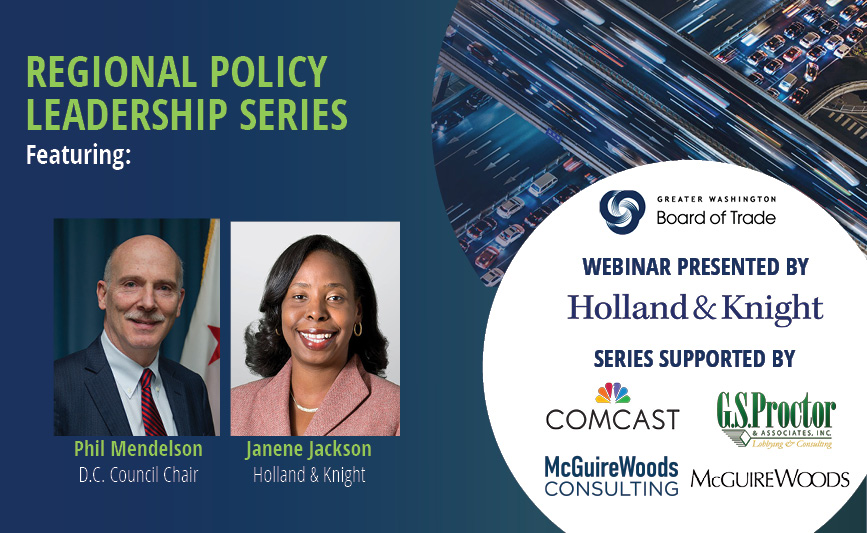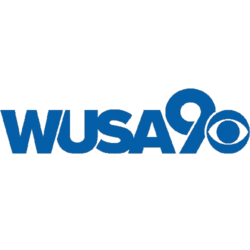Regional Policy Leadership Series: DC Chairman Phil Mendelson talks policies impacting the Greater Washington region

The Greater Washington Board of Trade was thrilled to have DC Council Chair Phil Mendelson join our Regional Policy Leadership Series webinar on Wednesday, Nov. 2, to chat about a variety of topics and policies that impact business in the Greater Washington region.
Chairman Mendelson was joined by attorney and partner at Holland & Knight, Janene Jackson, who moderated the discussion that covered public policies that impact transportation, education, business initiatives, environmental issues, the region’s workforce amid a digital transformation, and much more.
Workforce talent is a huge concern for a variety of businesses that call the Greater Washington region home. And Mendelson didn’t shy away from saying that there is more the District can do to help make the Greater Washington area a place where people want to work and live.
“Well, I’m not going to say that we’re doing enough or that we are doing or that we have the right answers. For this year’s budget, we put about $20 million in for new special initiatives that are trying to help with job training and filling some of these hard-to-fill positions,” said Mendelson. “My view is that the council really needs to rely on hearing from stakeholders to understand what the most effective strategies are. But the short answer is we recognize the problem, and we have put some money into initiatives to try to help (promote workforce training and growing the region’s workforce).”
Mendelson also touched on how the pandemic showed the already existing digital divide that impacts businesses and communities across the region was even more prevalent than people realized. And that there needs to be advanced broadband access at affordable levels to all residents, and make sure that D.C.’s government is equipped to enhance its digital footprint.
One of the other key topics he covered was on transportation, specifically on how WMATA and its new CEO Randy Clarke can make headway in boosting a regional transit system that has been impacted by the COVID-19 pandemic and has seen staled growth due to issues with its rail transit cars and delays to maintenance projects to certain rail transit lines.
“Well, I’ve met with him a couple of times (WMATA’s Randy Clarke) … If I had to give him advice, it would be to make sure that you spend a lot of time reaching out and building relationships with regional players because you’re going to need them to support the (transit) system. And make sure that WMATA gets out of some of the high-bound bureaucracy that has held it back in the past … but I think he’s going to get it figured out,” said Mendelson.
Mendelson’s expertise on public policy in the District goes back to when he first served on the D.C. Council in the 1990s. And that knowledge allowed him to broadly engage on how D.C.’s positions impact the Greater Washington region as a whole and how D.C Council is moving and working regarding issues that are important to the business community and the region.
View the whole discussion with Chairman Mendelson here.
This Regional Policy Leadership Series webinar was presented by Holland & Knight. Supporting Sponsors of the event series are Comcast, G.S. Proctor & Associates, Inc., McGuireWoods Consulting LLC and McGuireWoods LLP. Thank you for supporting the Greater Washington Board of Trade and our region’s business community.
Broader Questions and Answers from Chairman Mendelson’s discussion with the Greater Washington Board of Trade and Holland & Knight:
Q: We are a connected jurisdiction. And you know, many of the things that happen in DC, you know, impact Maryland impact Virginia, and vice versa. As you know, companies across the region are struggling to fill positions at all levels. We know that we have police officers, you know, police departments that need more officers, hospitals that need more nurses, schools, and teachers, and so on. Can you talk to us about what the council is doing to address these current shortfalls?
A: Well, I’m not going to say that we’re doing enough or that we are doing or that we have the right answers. For this year’s budget, we put about $20 million in for new special initiatives that are trying to help with job training and filling some of these hard-to-fill positions. We’ve come to increasingly use the University of the District of Columbia for some workforce training programs such as for teachers and social workers, and we put money in some additional money in the Department of Employment Services to fund the Infrastructure Academy. Money into WIC for the career coaches initiative. I mentioned I, and when I mentioned UDC, I left out nurses. There’s another program called Career Pathways, there are a number of different initiatives, but I’m not going to say every one of them was great. I’m not saying we were putting enough money into them, maybe there are some that we should be putting more money in. And others we should put less money in my view is that the council really needs to rely on hearing from stakeholders to understand what the most effective strategies are, but the short answers, we recognize the problem, and we put some money into initiatives to try to help.
Q: One of the things you worked on during the height of the pandemic, or educational gaps, and you know, virtual and learning loss during that virtual period. Can you tell us about those efforts and sort of, you know, clearly how they’re going to lead to helping companies, you know, what you hope is that there’ll be jobs on the other end, and that students will be able to make up the difference in their experience. So, can you talk to us a little bit about what you did during the pandemic?
A: Yeah, let me start this way. We talked about job training, and we look at the Department of Employment Services or the WIC, or even UDC with regard to job training. And all that makes sense. But some of what I just said was education is job training. And public education is actually the best job training program there is because that’s really what sets the foundation. We have several 100 million dollars in federal money to help overcome learning loss. This is all part of the ARPA Act and the Cares Act. And I have to say that I’m disappointed that that money hasn’t gotten out the door quickly enough. as of a few weeks ago, I believe less than a third of the money had been spent. And I don’t know, I’m not going to convey optimism that all that money is going to be used as quickly or as effectively as it should be. I’m sounding somewhat critical of the government. Yeah, I am a bit critical, because I think we throw money into a lot of programs that don’t always have to follow through or as may be the most effective way to go about. I’ve been focused on how we improve public education at the K through 12 level. That’s a long-term strategy, not a short-term strategy in terms of job training. But as I said before, if kids graduate from high school with a high school diploma, that really means something that they’re literate, and so forth, then their position to go into the workforce and or go on to higher education and go into the workforce. So that’s where I’ve been focused is reducing teacher turnover, principal turnover, more budgets to build in the schools themselves, avoiding getting into the governance fight, which I think is a complete distraction, trying to increase attendance, and pressing through oversight, more work, intensive work on the part of educators to improve literacy.
Q: So, one of the other things that you addressed in during the pandemic was the digital divide, and the concern about students, can you tell us how the District of Columbia is working to ensure that, you know, DC remains on the forefront of technology or technological advances? And, you know, hoping to prevent the digital divide for some of its residents?
A: Well, this is I have to be honest; this is not my strongest issue in terms of all the issues I deal with in the council. Again, I’m not sure the government is doing enough. I think that we need to provide broadband access at affordable levels to all residents. I’m supportive of the idea of trying to create, I forget exactly what it’s called, but in the public space, or access to a Wi Fi, and also supporting our Office of the Chief Technology Officer with regard to how to protect the district and that’s not just the government but everybody in the district from issues with cybersecurity. so supportive of initiatives to expand access. And what we saw with a pandemic was in particular, with education that because we moved schools or remote teaching or remote learning, that access to the internet was critical and it was quite obvious very quickly.
Q: One of the other things impacting the region is transportation. And you know that the Greater Washington area anticipates adding 1.5 million people in the coming years. And the growth of that size is going to put significant stress on an already overburdened transit system. So, can you tell us why transit is critical to keeping us connected and discuss with us any additional funding for WAMATA? And do you expect to continue to support WMATA … and what other steps DC might take to improve the transit networks?
A: With regard to when WMATA, the council has been very supportive of WMATA. I worked with regional leaders four or five years ago to set up the Metro Rail Safety Commission. I’m concerned right now that there’s been some tension between the City Commission and the WMATA board, and the two need to work together. And instead of what appears to be a bit of a gotcha from one side or the other. I’m not quite sure who, but it is supportive of the Metro Rail Safety Commission, I was very much involved with the dedicated funding for infrastructure improvements, which is critical. I changed the way the District appoints its members to the WMATA board. And I think we’re getting better representation. We are struggling with the fact that Virginia when it adopted the dedicated funding, put restrictions that I think were too severe on alternatives participating. So basically, an alternate can be appointed by jurisdiction, but they can’t attend the meetings, they’re kind of left out in the dark. And then they have to come in and sit in for a regular member if the regular member can’t attend. It’s just, it’s crazy. It needs to find a better balance. I’ve actually talked to leadership in the Virginia Legislature and representatives in the Maryland legislature about trying to address that so that we can get alternates who are well-versed in issues so that we have better representation. There’s legislation pending in the council right now, that would encourage residents to use transit … the basic outline is that every resident would get a $100 fare card. And if they use it during the month, it gets replenished to $100 the next month. I will say that, personally, I think it’s important that the district works with Maryland and Virginia. This is a regional transit system. And we need to make sure that it is a viable operation. It’s been hurt by the pandemic, as we all know. And so, we need to make sure that it gets out of the pandemic and is thriving.
Become a member today
We need your voice at the table to make Greater Washington a place where everyone can succeed



















